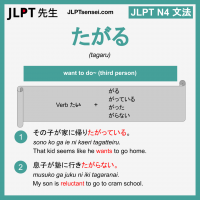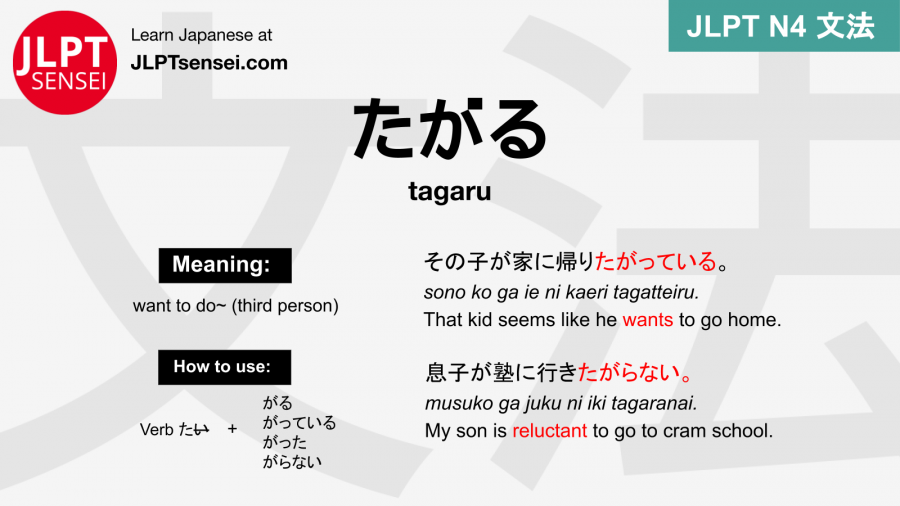Aprende gramática del idioma Japonés: たがる (tagaru). Significado: wants to do (3rd person).
たがる (tagaru) is for third person use only. If you want to say that «you» personally want to do something, use ~たい (tai) instead.
たがる (tagaru) stems from がる garu), which expresses that someone «appears to be~».
Example A) General Use
友達が留学したがる。
tomodachi ga ryuugaku shi tagaru.
My friend wants to study abroad (in general).
Example B) Current form
友達が留学したがっている。
tomodachi ga ryuugaku shi tagatteiru.
My friend is wanting to study abroad.
Example C) Past form
友達が留学したがった。
tomodachi ga ryuugaku shi tagatta.
My friend wanted to study abroad.
Example D) Negative form
友達が留学したがらない。
tomodachi ga ryuugaku shi tagaranai.
My friend does not want to study abroad.

Click the image to download the flashcard.
Download all N4 grammar flashcards.

Download our complete
JLPT N4 Grammar Master E-book.
Access ALL extra downloads, ebooks, and study guides by supporting JLPT Sensei on Patreon.
たがる - Oraciones de ejemplos 例文
Cada oración de ejemplo incluye ayudas como la lectura (hiragana) en Japónes, la lectura en romaji, y la traducción en Español.
Da clic en el siguiente botón rojo para alternar todas las ayudas, o puedes dar clic en los botones individuales para mostrar únicamente las que desees ver.
Ejemplo #1
その子が家に帰りたがっている。
Ejemplo #2
木村さんが、あなたに会いたがっていましたよ。
Ejemplo #3
娘は新しいi-phoneを買いたがっています。
Ejemplo #4
息子が塾に行きたがらない。
Ejemplo #5
息子はアニメを見たがっていますが、宿題が終わっていないので、見させません。
Ejemplo #6
彼女は仕事を辞めたがっていますが、転職先が見つからず、なかなか辞めることができません。
Ejemplo #7
みんな早く帰りたがっているのに、部長の話が長くてなかなか帰れません。
Ejemplo #8
息子が全然学校に行きたがらないんですが、学校で何かあったのでしょうか。
Vocabulario 語彙
| Kanji 漢字 |
Kana カナ |
English 英語 |
|---|---|---|
| 友達 | ともだち | friend |
| 留学 | りゅうがく | study abroad |
| 子 | こ | child |
| 家 | いえ | home; house |
| 帰る | かえる | to return home |
| 木村 | きむら | kimura (family name) |
| 会う | あう | to meet |
| 息子 | むすこ | son |
| 塾 | じゅく | cram school |
| 行く | いく | to go |
Ver todas las lecciones de gramática del JLPT N4



